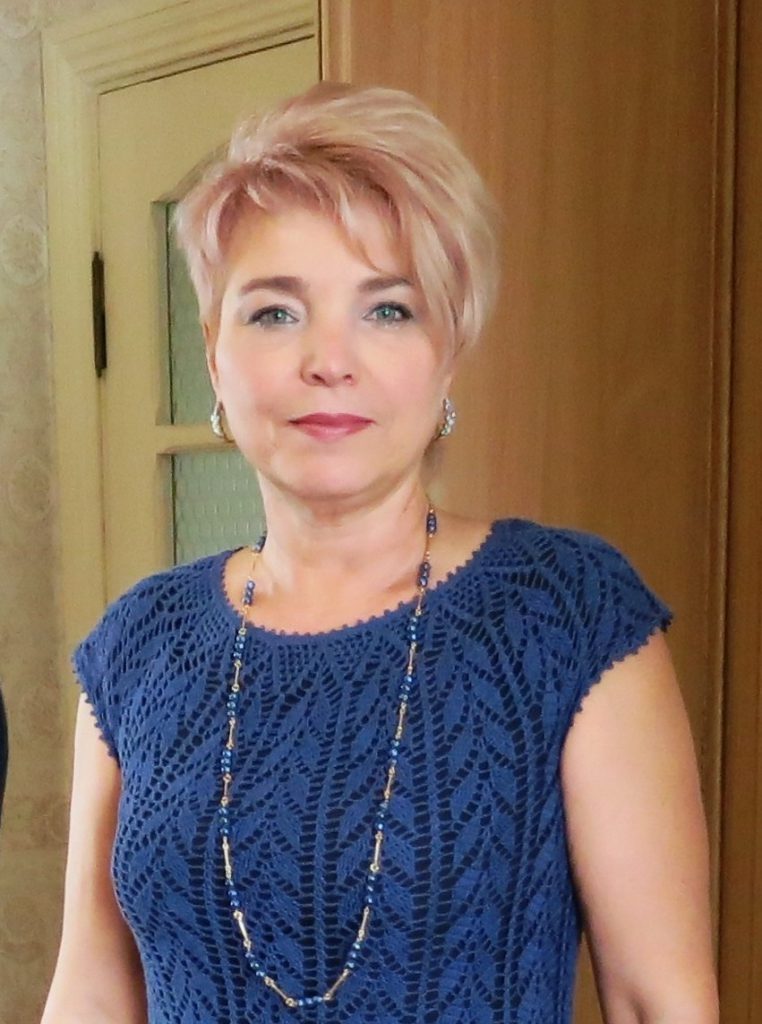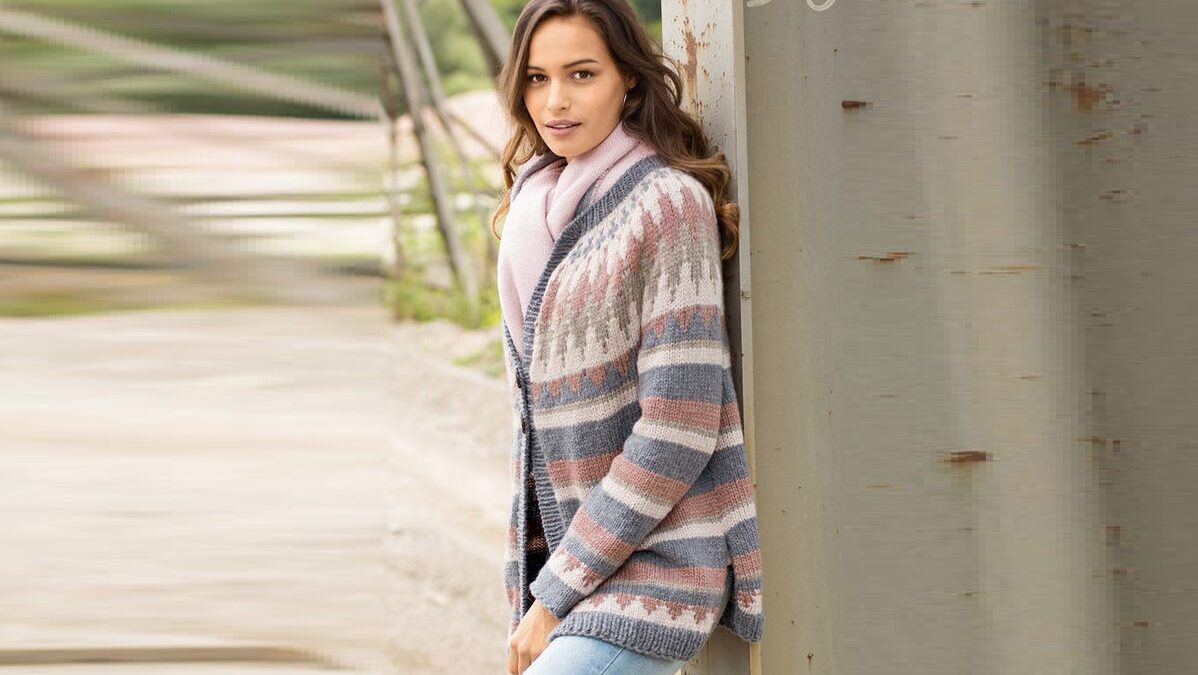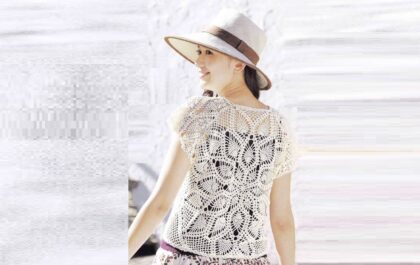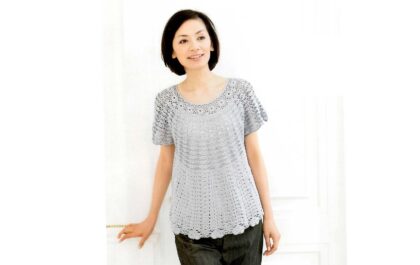
The cardigan with side slits and a large jacquard pattern on the yoke is made in pleasant pastel colors.
Dimensions
36/38 (40/42) 44/46

You will need
Yarn (78% natural wool, 12% cashmere, 10% polyamide; 110 m/50 g) - 200 (250) 300 g gray-blue, 150 (150) 200 g each color. powder and rosewood, as well as 100 (100) 150 g of taupe; knitting needles No. 7 and 8; circular knitting needles No. 7 and 8; embroidery needle for wool; 2 light brown buttons (size 31 mm).
Patterns and schemes
Patent Edge
Front rows: knit 1, slip 1 stitch as purl (thread behind work), knit 1.
Purl rows: slip 1 loop as a purl (thread before work), 1 knit stitch, slip 1 loop as a purl (thread before work).
Rubber
Knit (knitting needles No. 7) an odd number of stitches.
Front rows: edge, alternately 1 purl, 1 front, finish with 1 purl, edge.
Purl rows: knit loops according to the pattern.
Knit the following patterns on needles No. 8.
Facial surface
Front rows - front loops, purl rows - purl loops.
Jacquard pattern A
The number of loops is a multiple of 6 + 9. Knit according to. counted pattern 1 in stockinette stitch with threads from different balls using the Norwegian technique, while the unused thread is pulled freely on the wrong side of the work. Knit with the main thread color. powders. The counting chart shows the facial rows. In purl rows, knit thread colors according to the pattern. Start with loops before the repeat, repeat the repeat constantly, finish with loops after the repeat. Complete rows 1–8 once.

Jacquard pattern B
The number of loops is a multiple of 6 + 9 + 2 edge loops. Knit as pattern A, but instead of thread color. powder, use blue-gray thread, start and end with 1 edge.
Sequence of stripes
4 rows of gray-blue thread,
* 2 rows of gray-brown thread,
6 rows with thread color. rosewood,
10 rows of gray-blue thread,
4 rows with thread color. powders,
from * constantly repeat.
Emphasized decreases
At the beginning of the row: edge stitch, knit 2 stitches together.
At the end of the row: knit according to. pattern until the last 3 loops, then knit 2 loops together with a slant to the left (slip 1 loop as a knit stitch, knit 1, then pull it through the removed loop), edge stitch.
Jacquard pattern C
The number of loops at the beginning is a multiple of 6 + 9 + 2 edge loops = knit as pattern A, but according to counting pattern 2. Start with 1 edge and loops before the repeat, repeat the repeat constantly, finish with loops after the repeat and 1 edge. Perform rows 1–40 once.

Closing loops with a needle
Leave the end of the thread three times the length of the edge of the placket and thread it through an embroidery wool needle.
Step 1: insert the needle into the 1st loop from the wrong side to the front side and pull the thread through.
Step 2: skip 1 stitch, insert the needle into the 3rd stitch from right side to wrong side and pull the thread through.
Step 3: insert the needle into the 2nd (skipped) loop from the wrong side to the front side, while bringing the needle out under the thread stretched in front of the loop. Pull the thread.
Step 4: insert the needle into the 4th (one after the 2nd) loop from the front side to the wrong side and pull the thread through.
Step 5: insert the needle from the wrong side to the front side into the 3rd (skipped) loop, while bringing the needle over the thread stretched in front of the loop, and pull the thread through.
Constantly repeat steps 2–5 until all loops are closed.
Knitting density
14.5 p. x 22 r. = 10 x 10 cm, knitted with jacquard patterns A and B and stockinette stitch;
3 p. = 1 cm, knitted with patent edge;
16 p. x 23 r. = 10 x 10 cm, knitted with jacquard pattern C.
Completing of the work
Back
Using gray-blue thread on knitting needles No. 7, cast on 81 (87) 93 loops in a cross-shaped cast-on and for the placket, knit 4 cm with an elastic band, while for the edges of the cut, knit the first and last 3 loops with a patent edge.
Then on both sides continue to work with a patent edge with a gray-blue thread, on 75 (81) 87 middle loops continue to work with jacquard pattern A.
After 3.5 cm = 8 rows from the bar, continue working with pattern 3 according to. sequence of stripes.
Attention
Knit each patent edge with a thread from a separate ball - except for the gray-blue rows of the sequence of stripes - and when changing colors, cross the threads on the wrong side of the work to avoid the formation of holes.
After 13.5 cm = 30 rows from the bar, the end of the cut is reached.
Then finish the patent edges on both sides; to do this, knit 3 loops with color thread. powder together with the front one and then knit the resulting loop as a simple edge loop, according to. thread color = 77 (83) 89 p.
After 35.5 cm = 78 rows from the bar, close 1 x 4 stitches on both sides for a raglan bevel, then subtract 3 x 1 stitches in every 2nd row.
At the same time, after 36.5 cm = 80 rows from the bar, continue working with pattern 5, while immediately after the edge, constantly repeat the repeat and finish with 1 loop after the repeat and 1 edge = 63 (69) 75 p.
After 40 cm = 88 rows from the bar, pull through the next or previous edge loop, respectively, and leave the remaining 61 (67) 73 stitches.
Left shelf
Using gray-blue thread on knitting needles No. 7, cast on 40 (43) 46 loops in a cross-shaped cast-on and for the placket, knit 4 cm with an elastic band, while for the edge of the cut at the beginning of the row, knit the first 3 loops with a patent edge with a gray-blue thread, at the end of the row, knit a simple edge acc. thread color.
Then, at the beginning of the row, continue working with the patent edge with a gray-blue thread (see back), on the remaining 37 (40) 43 p., continue working with jacquard pattern A, and after the patent edge, start with 1 (4) 1 p. before the repeat, repeat the rapport constantly, finish 5 stitches after the rapport and 1 edge stitch.
After 3.5 cm = 8 rows from the bar, continue working with stockinette stitch according to. sequence of stripes.
Finish the patent edge as on the back = 38 (41) 44 p.
Make a raglan bevel along the right edge as on the back, and at the height of the back continue to work with jacquard pattern B. In this case, jacquard pattern B - there are 34 (37) 40 stitches on the knitting needles - start with 1 edge and 3 (0) 3 stitches. before the rapport, repeat the rapport constantly, finish 5 stitches after the rapport and 1 edge. At the height of the back, along the edge of the raglan bevel, pull the next stitch through the edge and leave the remaining 30 (33) 36 stitches.
Right shelf
Knit in the same way as the left front, but in a mirror image; for this, jacquard patterns A and B along the side of the front should always start with 1 edge and 4 stitches before the repeat.
Sleeves
Using gray-blue thread, cast on 35 (41) 47 stitches in a cross cast-on on needles No. 8 for each sleeve, then knit 3.5 cm = 8 rows in stockinette stitch and 3.5 cm = 8 rows in jacquard pattern A, starting and ending 1 edge.
Continue working with stockinette stitch according to. sequence of stripes.
To bevel the sleeves, add 1 x 1 p. on both sides after 13.5 cm = 30 rows from the initial row, then in the next 20th row 1 x 1 p. and in every 10th row 3 x 1 p. thread color and pattern = 45 (51) 57 p.
Raglan bevel after 39 cm = 86 rows from the initial row, as on the back.
At the same time, after 40 cm = 88 rows from the bar (= 37 (43) 49 p.), continue working with jacquard pattern B, while starting with 1 edge and the last 2 loops before the repeat, repeat the repeat constantly, finish with the first 3 p. after the repeat and 1 edge.
After 43.5 cm = 96 rows from the initial row, pull through the next or previous edge loop, respectively, and leave the remaining 29 (35) 41 stitches.
Round yoke
Cast on the loops of the right front, 1st sleeve, back, 2nd sleeve and left front one by one on circular needles No. 8 and on all 179 (203) 227 loops, first knit 0 (2) 6 rows in stockinette stitch with color thread. powders.
Continue working with jacquard pattern C = 28 (32) 36 repeats + starting and ending stitches. In the 29th row, decrease a total of 58 (66) 74 p., in the 37th row - a total of 60 (68) 76 p. acc. scheme.
After 17.5 cm = 40 rows (18 cm = 42 rows) 20 cm = 46 rows from the beginning of knitting the yoke, leave the remaining 61 (69) 77 stitches.
Assembly
Sew raglan seams, as well as side seams from the end of the cuts and sleeve seams.
For the strap, using gray-blue thread, cast on circular needles No. 7 along the sides of the shelves, 96 (98) 102 loops each, while marking the last cast-on loop before the neck and the 1st cast-on loop after the neck as corner loops, leaving 61 (69) between them ) Knit 77 stitches.
With an elastic band, knit 253 (265) 281 sts, while in the 1st purl row between the edges, start and finish with 1 purl and at the same time for the 3rd size on the neck area, evenly distributed, decrease 4 sts = 253 (265) 277 sts .
In the 4th row from the set of loops (= front row) make 2 holes for the loops, to do this, make 1 yarn over and knit 2 loops together with a slant to the left (slip 1 loop as a knit stitch, 1 knit stitch, then pull it through the removed loop) .
Make the bottom hole for the button 59 (61) 65 stitches from the edge, the next hole at intervals of 8 stitches.
At the same time, in the same row, on both sides of the corner loops, add 1 knit crossed loop from the transverse thread and in the next 2nd row, on both sides of the corner loops, add 1 purl crossed loop from the transverse thread = 261 (273) 285 p.
After 3.5 cm = 7 rows from the set of loops, knit 2 more rows as follows: edge stitch, knit all knit stitches, slip purl loops like purl stitches, and pull the thread in front of the loop.
After these two rows, close all the loops with a needle.
Sew buttons.
Related posts
About the Author

Welcome !
My name is Lilia. The main hobby of my life is knitting. I started with knitting needles and switched to a knitting machine. In 1988 I got acquainted with crochet - Romanian lace. About 10 years ago I became interested in Irish lace and Shetland knitting. And now I’m trying fillet crochet. On this site I want to share with you my 45 years of experience in various knitting techniques.
Latest publications
Crochet summer blouses. Part 9
Collection of women's models for the summer season.
Summer pink blouse
Crochet models with a round yoke. Part 8
A collection of women's models for the summer season with a round yoke.
Топ на пуговицах
Изумрудный топ
Blog Subscription
Be the first to receive new items!



